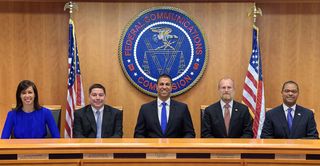FCC commissioner calls bullshit on FCC's own broadband availability report
A recent broadband report says the digital divide is closing, but there's evidence to suggest otherwise.

Depending on who you ask, the FCC's latest US broadband deployment report is either cause to be "proud of the progress" that's been made towards providing more Americans access to fast internet, or it's flat out wrong and "bears no relation to reality." And that's just if you chat with members of the FCC's five commissioner panel.
The opinions fall on two ends of the political spectrum. For better or worse, politics and broadband are intertwined. The FCC's recently released 2020 broadband report (PDF) highlights this inescapable truth. In it, the agency at large proclaims "available evidence demonstrates that the digital divide continues to narrow as more Americans than ever before have access too high-speed broadband."
The numbers in the report seemingly bear this out. The FCC defines 'fixed broadband' as 25Mbps downstream/3Mbps upstream, and according to the report, the number of Americans lacking access to fixed broadband service at those speeds dropped by than 14 percent in 2018, and more than 30 percent between 2016 and 2018.
It also claims that the "vast majority of Americans" (more than 85 percent) have access to 250Mbps/25Mbps service. This doesn't mean they are necessarily subscribed to those speeds, but they're available, according to the report. The report concludes that broadband deployment is expanding in a "reasonable and timely manner."
"Under my leadership, the FCC’s top priority is to close the digital divide, and I’m proud of the progress that we have made," FCC chairman Ajit Pai said in a statement (PDF).
As noted by CNET, the two Democrats serving as FCC commissioners sharply disagree with the report's findings and their Republican colleagues on the panel. FCC commissioner Jessica Rosenworcel has been particularly outspoken on the topic.
"The FCC's rosy view that all is well bears no relation to reality. Moreover, the agency's methods leave a lot to be desired," Rosenworcel stated in an op-ed posted to CNN.
The biggest gaming news, reviews and hardware deals
Keep up to date with the most important stories and the best deals, as picked by the PC Gamer team.
One of the issues Rosenworcel takes with the report is the claim that just 18 million people in the US lack access to broadband service.
"This number wildly understates the extent of the digital divide in this country. That's because if a broadband provider tells the FCC that they serve a single customer in a census block, the agency assumes service exists throughout. The result is data that systematically overstates service across the country," Rosenworcel says.
Rosensorcel's op-ed points to studies showing the actual number of Americans lacking access to broadband service could be as high as 162 million. She also took the FCC to task for ignoring issues like price and affordability, and called for the agency to adjust its definition of broadband, suggesting a baseline of 100Mbps (downstream).
It's unfortunate that political affiliation plays a role in any of this. Numbers are not supposed to lie, but how they're gathered, analyzed, and presented can all be misleading. And depending on who you ask, one side or the other is bending the truth.
Paul has been playing PC games and raking his knuckles on computer hardware since the Commodore 64. He does not have any tattoos, but thinks it would be cool to get one that reads LOAD"*",8,1. In his off time, he rides motorcycles and wrestles alligators (only one of those is true).
Most Popular





